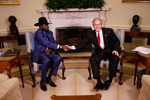Special Topics
Cell Phones and Congo’s Women Op-Ed

In an op-ed from our own John Prendergast and actor/activist Robin Wright Penn in the San Francisco Chronicle, the two discuss the huge role that Congo’s vast mineral wealth plays in that country’s continuing violence.(Robin has been a great supporter of our work and efforts to improve the lives of Congo’s women, and we cannot say enough nice things about her.) Make sure to visit our Raise Hope for Congo site and view the infographic on Congo’s resources as well ...
Ethiopia’s Assault on human rights
Today, the Ethiopian government passed a controversial bill that puts serious restrictions on the ability of foreign and local aid agencies in Ethiopia to work on a number of key issues, such as human rights, criminal justice and conflict resolution and reconciliation. The law is so restrictive that close observers such as Human Rights Watch’s Chris Albin-Lackey predicted before it was passed that it “will render the activities of most international and local human rights organizations illegal” – an ominous trend given Ethiopia’s own internal problems, its controversial military role in Somalia and lingering tensions with Eritrea. Another insider warned ...
More on the Bush Airlift

Both the New York Times and Washington Post have more on the Bush Administration's decision to push through an emergency airlift of supplies to the United Nations Mission in Darfur.It now seems even more obvious that this decision has more to do with making President Bush feel better about himself and his legacy than fixing the situation in Darfur. The announcement gave President Bush something to say during his photo op with Sudanese First Vice President Salva Kir at the White House, but does little to change the situation on the ground in a meaningful way. Bush went out of ...
The Cycle of Ineffective Crisis Management
John Boonstra responds to our own Julia Keyser’s analysis of the “re-hatting” of peacekeeping missions by the United Nations, noting the “predictable double-dip of disappointment” that occurs when regional forces and then UN blue helmets successively fail to keep non-existent peace in Sudan or Somalia. So if we know that under-equipped regional missions can’t get the job done, and that UN missions that lack the requisite political leadership will just kick the can down the road while doing little to protect civilians under-fire (as in Congo), why does history keep repeating itself? Those of us who work on resolving conflict ...
No News is not Good News
Tara Sonenshine, who is very savvy about the media, has a good post up on Huffington about the continued economic woes of the newspaper business and its impact on foreign reporting. Coverage of international affairs is often the first to be sacrificed as papers look to cut costs, and this is a real tragedy. People certainly have lively debates about whether “the CNN effect” drives U.S. foreign policy or not, but it seems self-evident that fewer reporters on the ground will make the work of combating mass atrocities and war crimes harder, not easier ...
Murder by Numbers
A very interesting piece in the Washington Post today on how people respond to suffering and mass atrocities. The article features comments not only from my colleague, John Prendergast, but insights from the research of Paul Slovic. Slovic’s basic thesis: people’s emotional response to tragedy and suffering essentially becomes watered-down and more diffuse as the sheer number of people suffering rises. The fundamental logic is generally sound, but I would also ask: why then did people respond so viscerally to the attacks of September 11 and the mass casualties inflicted on that horrible day? Several factors: the attacks were intensively ...
Too Little; Too Late
In its waning weeks, the Bush Administration appears to be feeling a new urgency in dealing with Darfur. The administration just announced a new emergency airlift of vehicles and supplies to the UN Mission in Darfur. What exactly is being supplied is still unclear, although the administration says this move falls short of direct U.S. military involvement in the conflict. It would be interesting to know the degree to which this decision was coordinated with the incoming Obama team ...
The New Yorker profiles humanitarian workers in eastern Chad
A recent New Yorker article, “Lives of the Saints,” by Jonathan Harr, details the work of the United Nations Refugee Agency (also known as UNHCR) in eastern Chad. While the article focuses primarily on the personal trials and tribulations of the expatriate UN staff working in some of the twelve refugee camps that UNHCR. operates in eastern Chad, the author does not shy from critiquing the institutional flaws of UNHCR (certainly another story in itself). The article also provides some context on the general lawlessness and armed banditry that plagues eastern Chad, which confirms the sad reality that the over ...
Why We Like Kristof
Nicholas Kristof’s recent New York Times op-ed, “A New Chance for Darfur,” underlines why a new Obama administration is well placed to take “serious steps” to end the crisis in Darfur. In effect, Kristof is saying what the Enough Project has been saying for some time—although the situation in Darfur is still dire, there are opportunities in the midst of crisis, and the incoming Obama administration is uniquely suited to tackle the Darfur crisis if he makes ending the genocide a priority instead of following the Bush administration’s policy of what John Prendergast, John Norris, and Jerry Fowler recently called ...
The LRA strikes back (on civilians)
Although Lord’s Resistance Army leader Joseph Kony thinks he is a messiah and claims to be a fundamentalist Christian, he apparently had no qualms about ordering his notoriously brutal rebel army to commit horrific acts of death and destruction against local Congolese populations as the LRA fled their outpost in Congo’s Garamba National Park following the launch of “Operation Lightening Thunder,” joint offensive begun in mid-December by the armies of Uganda, Congo, and southern Sudan.On Christmas day, the L.R.A killed 40 people in the village of Faradje; the BBC reported that the LRA. cut off peoples’ lips as a warning ...

